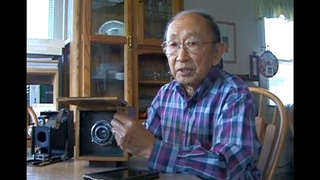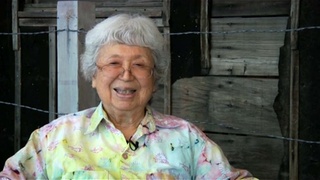Interviews
Embarrassed to talk about camp
We came out of camp and I was living in Long Beach, and I saw one of the girls that I used to play in camp with – her name was Akiko Shigetomi – and I remember seeing her. We met and we were very embarrassed to talk and we never mentioned camp. We never mentioned camp and…but it was so subconscious, when I think of it now, that it was like it was a bad dream or that there was some shame involved with it. So you just don’t refer to it. And it wasn’t. And then, of course, I realized that it was totally suppressed during my teenage years and it wasn’t really until we wrote the book that all of this came out and all that, you know, traumatic, emotional…what had happened emotionally was so traumatic.
And I know it wasn’t just for myself. And that’s why when…it was like seeing…I try to give it a metaphor. Like seeing somebody that you’ve experienced something with – like maybe you were raped or something – and then you see each other and you know you both went through that but you never mention it. It’s like, “Hey, unsaid. We’re not going to talk about that. We’re not going to even recognize that that happened to us.”
Later on, as I got older, it would be, you know, we could mention it and think, “Oh yeah, remember in camp…” but I remember just coming out because we were too young and it was the wounds were too raw. We didn’t know what happened to us. We didn’t know that we were…all we knew was that we were going to be hated when we got out of that camp.
Date: December 27, 2005
Location: California, US
Interviewer: John Esaki
Contributed by: Watase Media Arts Center, Japanese American National Museum
Explore More Videos

Rounding up Issei and Nikkei
(1922–2014) Political and civil rights activist.

His father describes the importance of photographing camp life
(1924-2016) Photographer and businessman.

Importance of education in achieving redress for incarceration
(1919-2014) Activist for civil rights and redress for World War II incarceration of Japanese Americans.


Mixed emotions after declaration of war on Japan
(b.1913) Kibei from California who served in the MIS with Merrill’s Marauders during WWII.


Train ride to Jerome Relocation Center
(b.1913) Kibei from California who served in the MIS with Merrill’s Marauders during WWII.

Atmosphere in his Merrill’s Marauders unit when surrounded by Japanese soldiers
(b.1913) Kibei from California who served in the MIS with Merrill’s Marauders during WWII.

Response to loyalty questionnaire
(b.1909) Nisei from Washington. Incarcerated at Tule Lake and Minidoka during WWII. Resettled in Chicago after WWII

Larry designing chairs in the camp
Sister of automotive designer Larry Shinoda

Move from Tule Lake to Minidoka
(b.1909) Nisei from Washington. Incarcerated at Tule Lake and Minidoka during WWII. Resettled in Chicago after WWII

Under suspicion after Pearl Harbor
(b. 1924) Political scientist, educator, and administrator from Hawai`i

Family's deportation from Peru to U.S. after the bombing of Pearl Harbor
(1930-2018) Nisei born in Peru. Taken to the United States during WWII.

Conditions aboard U.S. transport ship while being deported from Peru
(1930-2018) Nisei born in Peru. Taken to the United States during WWII.

Receiving a negative reaction from father upon asking about World War II experience
(b. 1939) Japanese American painter, printmaker & professor
